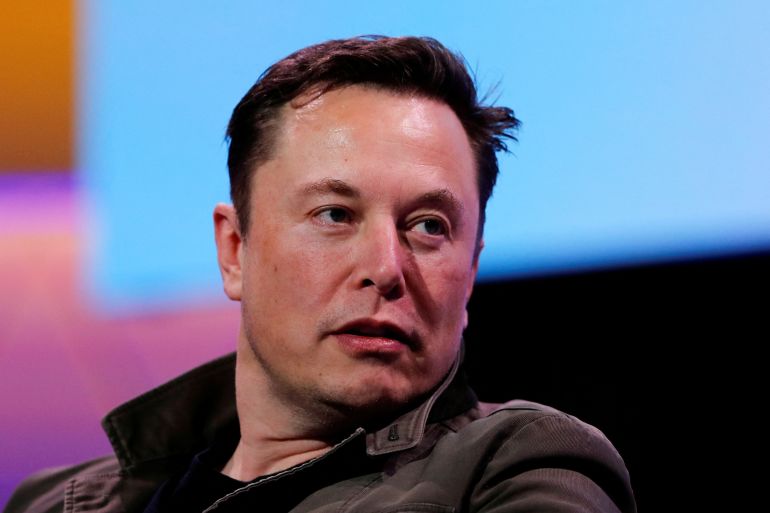Musk’s Twitter deal back on: What you need to know
Elon Musk has made yet another U-turn on the acquisition of Twitter, days before he is scheduled to appear in court.

Billionaire Elon Musk is proposing to proceed with his original $44bn bid to take Twitter Inc private, an offer contingent on the social media company halting the legal proceedings against him.
Musk made a surprising turnaround less than two weeks before a trial over his attempt to back out of the buyout was scheduled to start in Delaware, United States.
Keep reading
list of 3 itemsTwitter whistleblower raises security concerns before US Congress
Twitter shareholders approve Musk’s $44bn buyout offer
In the months-long rollercoaster since the initial offer to buy Twitter in April, the Tesla CEO faced a huge legal challenge that could have forced him to pay up.
While some logistical and legal hurdles remain, an agreement could in a matter of days put the world’s richest person in charge of one of the most influential media platforms.
Here is what you need to know about the Twitter vs Musk face-off:
Why did Musk back out of buying Twitter?
Musk grounded his argument largely on the allegation that Twitter misrepresented how it measures the magnitude of “spam bots” – or automated accounts – that are useless to advertisers.
Within weeks of agreeing to buy Twitter, he said the number of bot accounts was much higher than Twitter’s estimate of less than five percent of users.
He claimed in July that he could walk away from the deal because Twitter misled him about the number of real users and the security of user data.
A trial was due to start on October 17 in the Court of Chancery in Georgetown, Delaware, to determine whether anything had changed since the merger agreement was signed that would justify terminating the deal.
It was unclear whether Musk undertook due diligence regarding the company prior to committing to buying it for $54.20 per share, or about $44bn.
Why is the Twitter deal back on?
Musk made the surprising turnaround in a letter to Twitter that the company disclosed in a filing on Tuesday with the US Securities and Exchange Commission.
Musk said his offer was contingent on stopping the legal proceedings.
In response, Twitter said it intended to close the transaction at the original price of $54.20 per share, but stopped short of saying it would drop its lawsuit against the Tesla CEO.
It was not immediately clear why Musk chose to abandon his fight, although some pointed to his court deposition scheduled for Thursday, in which he may have been obliged to divulge some uncomfortable facts.
In addition to the trial looming, Musk was facing potential rising interest costs. If he lost the trial, the judge could not only force him to close the deal but also impose interest payments that would have increased its cost.
A settlement would allow Musk to finance the transaction without any complications, whereas renegotiating the price would technically allow committed backers to walk away.
That is something Musk likely wants to avoid given the downturn in markets since the deal was signed. The banks that agreed to finance the acquisition are likely to lose hundreds of millions of dollars on the deal because they would struggle to attract investors to buy the debt.
Musk secured a financing commitment to provide a $12.5bn margin loan to support his Twitter acquisition and has already sold $15.4bn worth of Tesla shares.
Under their present commitments, the financial institutions must provide the financing irrespective of whether they can sell the loans and face long legal odds of freeing themselves from the commitment.
What does this mean for the future of the social media platform?
Since Twitter has already received shareholder support for the sale to Musk, the deal could close quickly in the coming weeks if the two sides were to settle on the original terms.
Musk on Tuesday tweeted that “Twitter probably accelerates X by 3 to 5 years,” echoing suggestions he made in June about creating a “super app” or marketplace for different apps and features like WeChat, which is popular in China.
Musk also has said he wants to create a money transfer feature.
Supporters of Donald Trump hope that Musk will reactivate the account of the former US president, who was banned after the January 6, 2021, attack on the US Capitol by his supporters.
The platform could also give Musk a megaphone with which to stir controversy. The billionaire, who has more than 100 million followers, has used Twitter to share his thoughts about everything from his disapproval of COVID mandates to unverified claims on how the virus affects children.
On Monday, he floated a peace plan for the Ukraine-Russia war that drew swift condemnation from Ukraine’s President Volodymyr Zelenskyy.
The possibility of his takeover of the social media giant has stirred debate around freedom of speech and the role of social media platforms in regulating the flow of information.
Musk had complained about Twitter’s moderation of posts that it deems hateful or classifies as disinformation, but it remains unclear how the potential change of ownership may affect the day-to-day user experience.